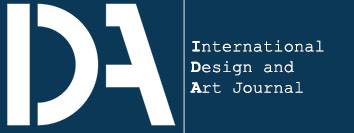Training Model in Interior Architecture: Learning in Experience
Keywords:
Interior Architecture, Experience, Learning, Design, ApplicationAbstract
Education is one of the most important concepts to be considered in order to develop developing societies. The concept of learning has an important place in education which is a job of gaining knowledge and skills in a subject, raising and developing. Learning is the ability to create reactions and behaviors in response to certain situations and problems, to change them if necessary and to acquire new ones. Experiential learning is; it is a structuring towards educational experience, reflective observation from concrete experience, and then from abstract conceptualization to active experience. Within the scope of spatial perception, belongingness enables us to use the space more conveniently. In the design education, the participation of the workshops to the people leads to more qualified works. In this context, Selcuk University, Faculty of Fine Arts, Department of Interior Architecture and Environmental Design, 2017-2018 Spring Semester, Building Project course with the 4th-grade students, faculty classrooms and workshops, interior design education in the context of learning and designed to practice propanol.
Within the scope of the study, two different workshops, Z16 and 247, were designed and designed by the students. Workshops are designed based on the re-function of recycled materials and their use. The aim of the study is to transfer the knowledge remaining, in theory, to design practice in professional practice.
As a result; undergraduate students had the opportunity to experience the process by applying the designs they thought. In addition, students learned to work as a team during design and implementation and developed their decision-making skills and sharing skills. Application; is an example to students, faculty, and visitors within and outside the discipline of interior architecture.
References
Berber Üçkaya, N. (2014). Eğitim Mekânlarının Akustik Konfor Koşulları Bakımından İrdelenmesi: DEÜ Mimarlık Fakültesi Örneği. Yayımlanmış Yüksek Lisans Tezi, Dokuz Eylül Üniversitesi Fen Bilimleri Enstitüsü, İzmir.
Canbakal Ataoğlu, N. (2009). Çağdaş Mimaride Bir Antitez: Sirkülasyon. Yayımlanmış Doktora Tezi, Karadeniz Teknik Üniversitesi, Fen Bilimleri Enstitüsü, Trabzon.
Ching, F. D. K. (2002). Mimarlık, Biçim, Mekân ve Düzen. İstanbul: YEM Yayın.
Coyne, R. D., Snodgrass, A. B., Martin, D. (1994). Metaphors in The Design Studio, Journal of Architectural Education, 48(2), s.113-125.
Gibson, J. J. (1950). The Perception of Visual World. Cambridge, USA: The Riverside Press.
Evin Gencel, İ. (2006). Öğrenme Stilleri, Deneyimsel Öğrenme Kuramına Dayalı Eğitim, Tutum ve Sosyal Bilgiler Program Hedeflerine Erişi Düzeyi. Yayımlanmış Doktora Tezi, Dokuz Eylül Üniversitesi Eğitim Bilimleri Enstitüsü, İzmir.
Hasgül, E. (2011). İç Mekânda Yön Bulma: Büyük Ölçekli Binalarda İnceleme. Yayımlanmış Yüksek Lisans Tezi, İstanbul Teknik Üniversitesi Sosyal Bilimler Enstitüsü, İstanbul.
Müezzinoğlu, M. K. (2018). Eğitim Mekânlarında Kullanılan Renk ve Işığın Öğrencilerin Fonksiyonel ve Algısal Değerlendirmeleri Üzerindeki Etkileri, Doktora Tezi, Selçuk Üniversitesi, Fen Bilimleri Enstitüsü, Konya.
Okuyucu, E. Ş. ve Çoban, G. (2019). İç Mimarlık Atölyelerinin Deneyimlenmesi. Yakın Mimarlık Dergisi, 2(2), s.103-117.
Özgen, K. (2012). Yapılandırmacı Öğrenme Yaklaşımı Kapsamında, Öğrencilerin Öğrenme Stillerine Uygun Öğrenme Etkinlikleri Geliştirilmesi: Fonksiyon ve Türev Kavramı Örneklemesi. Yayımlanmış Doktora Tezi, Dokuz Eylül Üniversitesi Eğitim Bilimleri Enstitüsü, İzmir.
Silav Utkan, M. (2003). Tekerlekli Sandalye Kullanan Bedensel Engelli Çocuklara Yönelik Eğitim Mekânlarının Tasarım ve Biçimleniş Ölçütlerine Bir Yaklaşım. Yayımlanmış Sanatta Yeterlilik Tezi, Hacettepe Üniversitesi Sosyal Bilimler Enstitüsü, Ankara.
Wallis, L. (2007). Building the Studio Environment. Design Studio Pedagogy: Horizons for the Future içinde (Ed. Salama A. M., Wilkinson N.). Gateshead, UK: The Urban International Press, s.201-218.
Downloads
Published
Issue
Section
License
IDA: International Design and Art Journal is an open-access academic journal. All publishing rights of the accepted articles are deemed to assign to IDA: International Design and Art Journal. Articles can not be published and copied anywhere, and can not be used without reference.
IDA: International Design and Art Journal is licensed under a Creative Commons Attribution-NonCommercial-ShareAlike 4.0 International License.



